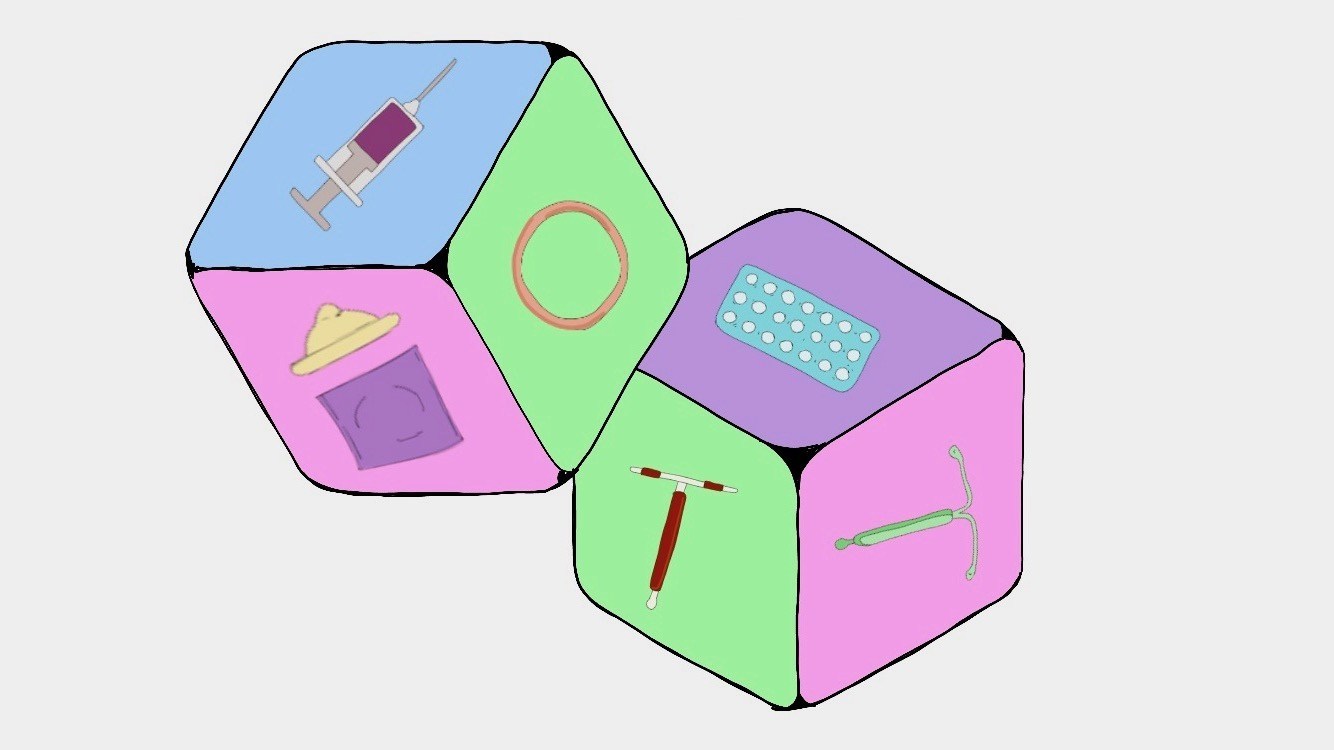This is the fourth installment of Crybaby’s monthly series, the Birth Control Diaries. The series was created by Story Editor Zoe Allen and Writer Irine Le to evoke conversation about and bring awareness to the trials and tribulations of birth control.
Illustration by Sam Tuvesson
 Maggie Wilde, 20, third year at Concordia University (Montréal, QC)
Maggie Wilde, 20, third year at Concordia University (Montréal, QC)
Birth control method: Drospirenone and Ethinyl Estradiol (The Pill)
Oral contraception, often times known as “the pill,” is a hormonal birth control method that is taken daily. The pill comes in two forms: a combination or progestin-only pill. According to Planned Parenthood, “it is safe, affordable, and effective if you always take your pill on time. Besides preventing pregnancy, the pill has lots of other health benefits, too.” For more information on the pill, click here.
You started on the hormonal pill when you were in high school. Tell me about your struggles with remembering to take your pill and the challenges of making sure you always had a refill of your birth control.
I always forgot to take the pill and then when I would have to catch up, if I took two pills too close together, I would get really sick and vomit. It got to the point where my parents were like “can you just stop taking birth control?” because I was sick all the time. I know a lot of people get nauseous if they take too many pills close together, but I would actually just throw up. It got bad because I was going once a month on a prescription from my local Rite Aid, so I’d have to go back every month to refill my prescription which really wasn’t the best for me because I would forget and then I’d be like a week behind and have to catch up. Obviously, it was my fault, but there seems like there should be a better system.
I ended up changing and going to Planned Parenthood because they give you six months to a year [of birth control] so I wouldn’t keep forgetting to go and refill. It was really bad because I was getting sick all the time, or a few times I was about to go on vacation or when I left for university I wasn’t able to get my prescription before I left so I would go off of it for a month, or a few months and then having to go back on it was just really bad for my body because it adjusts to the hormones and then you take them away. I would break out, I would get sick.
Was there anything you learned from your visits to Planned Parenthood about your body and how it reacts to birth control?
The last time I went [to Planned Parenthood] is when I learned about my ocular migraines. When I was in junior high, I used to get ocular migraines, which is when you get a migraine but when it’s coming on you see blurry lights in your vision. You know when you see those little worms float in your vision, it’s like that, but very intense and they don’t go away. It goes straight into a migraine. I got those when I was younger.
I originally got my [birth control] prescription from my doctor, who knew that I got ocular migraines. Recently, when I went to Planned Parenthood to refill my prescription after a year, they were going through a checklist and the nurse asked “do you have a history of cancer in your family?” those kind of questions that they usually go through. Then they asked, “do you have a history of ocular migraines?” and I said “yeah.” And they told me they had to get a doctor. They brought the doctor in and she said “I don’t know why you’re on hormonal birth control, you could have a stroke and either be paralyzed or die.” This is because first of all, birth control just in general gives you a higher chance of blood clots, but I guess with a history of ocular migraines, it can affect your brain when you get a blood clot. I was like, “I’ve been on this for four years, how come no one has told me this until now?” and I guess it was a miscommunication between my doctor and then when I went to Planned Parenthood. The [Planned Parenthood doctor] said “I want to take you off of birth control completely” and I said “no, that’s not happening” because I’ve had such a struggle with birth control and I’ve found one that works for me and I want to stay on it. The doctor said that she didn’t feel comfortable letting me do this, so she reduced my dosage. She told me that she could put me on a progestin pill or that I could use a diaphragm. I was like, “girl, this isn’t the 90s. I’m not using a diaphragm.” I wanted to stay on the pill, so I’m on the same pill, but a lower dose. It’s been fine so far, I just have really irregular periods but I’ve always had irregular periods ever since I started birth control.
What would you recommend to other people in similar situations? Do you think you have your birth control situation figured out? Would you recommend what you’re doing right now to other people with ocular migraines?
I would talk to your doctor or someone at your local clinic because I’ve found a lot, especially with clinics like Planned Parenthood, that they do great and all but they don’t know your personal medical history, because you’re just walking in and walking out. If you are knowledgeable enough to know this stuff about yourself, go in and tell them you have a history of ocular migraines and ask what your options are. You can get a copper IUD, which I have thought about too, but I get really bad cramps so I didn’t want to go forward with that. There are different options you can go with, you just can’t necessarily be on the generic pill. You should speak with your doctor or whoever is prescribing you and figure out whatever’s best for your situation.
Maggie suffers from ocular migraines and in one of her recent visits to Planned Parenthood, she learned that taking the hormonal birth control pill while also suffering from ocular migraines increases the chances of severe blood clots. With the help of her birth control clinic, she was able to lower the dosage of estrogen in her pill. If you suffer from ocular migraines, but want to be on birth control, talk to your doctor and read more here.

Natasha Pinda, 21, student at the University of Lincoln (Lincoln, UK)
Birth control method: Not currently using birth control
You mentioned that you’ve tried a number of different birth control methods before and now you’re off birth control. Which methods have you tried and what prompted you to go off of birth control?
I used a pill called Yasmin for a bit and it made me extremely anxious and nauseous, so the doctor recommended me another pill which seemed to have less of an effect but I still didn’t feel 100%. My last try was the contraceptive patch, which for me was the best, I didn’t feel anywhere near as bad as I did on the other two. It’s also good if you don’t like taking a pill everyday as one patch lasts a week, mine was called Evra.
I’ve come off it now, as I’m not in a relationship and thought it would be good to have a bit of break. But I think if I needed it again I would use the patch.
Since Crybaby is an American publication and our writers/the people we’ve featured [so far] have been American, I was wondering what is the overall attitude towards birth control in the UK? Were your doctors very willing to prescribe it or were they apprehensive?
My doctor was very encouraging actually, she really didn’t want me to just rely on condoms so was really helpful when I didn’t like the pills I tried, she made it clear there were lots of options. I learnt about the morning after pill at school, they told us which brand was the best. But for “every day” birth control I wasn’t taught about the wide variety available or the side effects so I wasn’t very prepared.
What are some physical or emotional side effects you’ve noticed now that you are off hormonal birth control, compared to when you were on it?
I’ve lost a little weight, I noticed I gained weight when I used the patch but not with the pills. This may be too much information, but sometimes I’d throw up when I was on Yasmin because I would get that anxious, so being off it has made me feel a lot calmer, less stressed, which is always nice.
Do you see yourself possibly going back on birth control in the future? Did you experience any positives, or do you prefer being hormone-free?
I wish I’d known the kind of side effects because at first I was very confused why I was suddenly so stressed about little things. I liked not having to take a pill everyday and I didn’t notice as many side effects as the others, no anxiety and less nausea. I’d try the patch again I think, it was the best one for me I felt, that I’d tried. Although going on to it from being completely off anything may highlight some side effects I wasn’t aware of, if that was the case I would try something hormone free.


 Maggie Wilde, 20, third year at Concordia University (Montréal, QC)
Maggie Wilde, 20, third year at Concordia University (Montréal, QC)